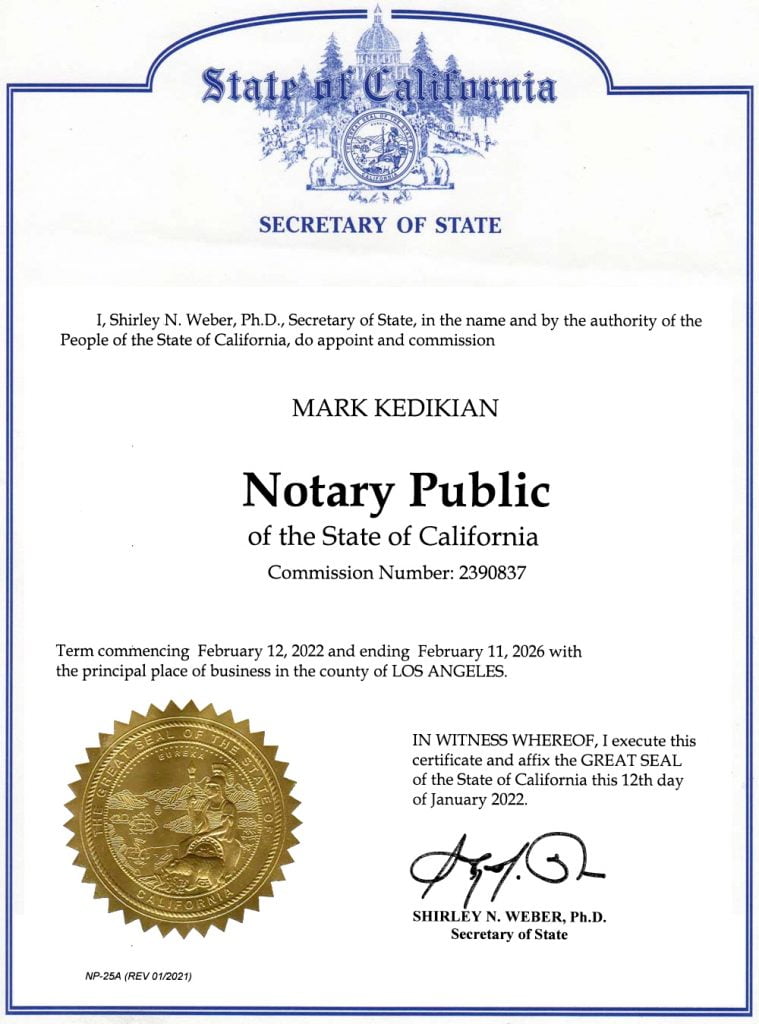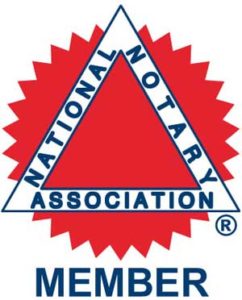Notary Requirements
Notary Requirements
Marco’s Notary adheres to all California laws governing the practice and procedures for Notary Publics. These procedures vary from those of other states and countries.
- The document signer must physically and personally appear before the Notary at the time of notarization – not before, not after. A telephone call from the signer or the notary’s familiarity with a signature is not substitute for a personal appearance. A webcam/Skype (or any other similar form of technology) appearance is not physically appearing before the Notary.
- Documents should not be signed before appearing before the Notary.
- The Notary identifies the signer through either (1) current government-issued ID card with photograph, signature, and physical description (such as a driver’s license or passport), or (2) personal knowledge of the signer based on knowing the person for an extended period with direct interaction and contact. A photocopy or picture (printed or digital) of the ID is not acceptable. If the image or details of the physical description on the ID card do not establish the identity of the signer to the satisfaction of the notary public, the ID card cannot be used. Expired ID cards can only be used under extenuating circumstances, and an ID card can be considered unsatisfactory by the notary public solely on the basis of the ID card being expired.
- The Notary should not be an interested party to any document that they notarize. Notary Publics should be independent, impartial, and disinterested to the benefits and obligations in any transaction they notarize. While not strictly prohibited, a Notary should avoid performing any official acts when the Notary’s immediate relative is a party. A Notary must not notarize any document that benefits the Notary in any way.
- Witnesses to any document that is notarized or signed by a person intended to be a witness should also not be an interested party. Witnesses should be independent, impartial, and disinterested in any transaction they witness. The signer of a document, notarized or not, should not be the signer(s) themselves. The witness(es) should not gain any material benefit from the document.
NOTARY PUBLIC REFUSAL
There are many reasons why a notary public may legally decline to notarize a document. Inadequate identification, inability to directly communicate in English, suspicion of unlawful or other improper purposes, or indication that the signer is under duress are a few legal reasons why a notary may refuse. A notary may also refuse service outside of established business hours, or if it would be an undue inconvenience, such as a large number of documents just before leaving the office. In these examples, the notary public’s objection is temporary, and would be willing to notarize at another time and/or place when it won’t unreasonably interfere with the notary public’s other duties and obligations.
The National Notary Association Code of Professional Responsibility states that a notary “shall not refuse to perform a lawful and proper notarial act because of the signer’s race, nationality, ethnicity, citizenship, religion, politics, lifestyle, age, disability, gender or sexual orientation, or because of disagreement with the statements or purpose of a lawful document.”
The code also states that notaries “shall not refuse to perform a lawful and proper notarial act solely because the signer is not a client or customer of the Notary or the Notary’s employer.” Besides being a bad business practice, it could be illegal for a notary to selectively decide who they will notarize based on the lack of any other business relationship or service being provided to the customer. As a Notary Public is covered under the NYS Public Officer Law, a notary should make their services available to all. The law states that it is “official misconduct” for any public servant to “knowingly refrain from preforming a duty which is imposed upon him by law or is clearly inherent in the nature of his office.”
A notary may not compel you to purchase any product or service as a condition of performing a notarial act. While we are hopeful you will avail yourself to our other services, such as obtaining an Apostille or having us UPS your document, you are not required to use any other services if you only want a notarization.
News Updates

Options for taxpayers who need help paying their tax bill
You must file your tax return by the deadline, regardless of your tax liability.
If you can’t pay the full amount of federal taxes you owe, there are options available for you.

Valuable tax benefits for members of the military
Members of the military may qualify for tax benefits not available to civilians. For example, they don’t have to pay taxes on some types of income. Special rules may lower the tax they owe or allow them more time to file and pay their federal taxes.

Filing season reminder for teachers: Some educator expenses may be tax deductible
The educator expense deduction allows eligible teachers and administrators to deduct part of the cost of technology, supplies and training from their taxes. They can only claim this deduction for expenses that were not reimbursed by their employer, a grant or other source.






